[one_half padding=”0 0 0 0px”]
Marble’s Game Getter
By David Higginbotham
[/one_half]
[one_half_last]
![]()
[/one_half_last]
[full_width]
I’ve had a lifelong fascination with oddball guns. The Marble’s Game Getter Gun, a storied gun with a long and troubled history, speaks to me. By today’s standards, the skeletal over-under is underpowered, and a bit slow. Yet the single-shot Game Getter Gun lives on in the survival-minded offerings of Springfield Armory, and Savage, and even Chiappa.
Let me set the scene. I am on my way out to the range to do a review when I realize I’ve forgotten all of my targets. No problem. I pass an old gun store on the way. I stop, go in for targets, and come out with a Marble’s Game Getter. It is going to be hard to explain to the wife, but it is worth it.
The Game Getter is an odd bird. It is an over-under pistol with a folding stock. The original was chambered in a number of varieties, all of which were intended to pair a rimfire round with a larger shot shell. Both barrels operated on the single shot model. Pull the trigger guard back and the breech opens. An extractor pushes up the empties, which can then be pulled out by hand. The grips on the Game Getters, depending on which model you have, were hard rubber, wood or (in rare instances) plastic.
The stocks are interesting, and the first part of the gun to go. The first model had a tubular steel stock that folded down toward the muzzle. The stock could be placed in the down position for awkward pistol shooting, or snapped into place and used as a shoulder stock. The original folded, but didn’t fold up.
The second model had a stock that actually collapsed when it was folded, which allowed the gun to be tucked into a (long) holster. The original stock is long gone from this one. In its place was a homemade, hand-carved wooden stock, which worked quite well.
This is one of the Second Model Game Getters. It has smooth wooden grips and only two sights. The first series had an additional tang sight that rose up behind the trigger on a narrow stem.
The original, introduced in 1909, was chambered in .22 and .44. The whole gun weighed in at 2.25 pounds. Later models would have other options, like a rifled second barrel in .25-20 WCF, .32-20 WCF or .38-40 WCF.
After World War I, the Second Model was introduced. This second iteration had stouter grips, and a slightly thicker chamber, and was cut for .22 and .410 (in either 2 or 2.5 inch).
The Game Getters were actually serious guns. They came with holsters, excellent sights and a dovetailed wooden box for storage.
The legal woes of the Game Getter
The originals were made with 12-, 15-, and 18-inch barrels. The National Firearms Act of 1934 made all of the game getters with smooth bores illegal. While the Feds were trying to curtail the use of short-barreled shotguns by criminals (at least that was the justification given to the public), they managed to kill the Game Getter and some other really useful pocket shotguns. In 1939, in what seems like a very rare circumstance, the ATF revised its ruling on the 18-inch Game Getter and removed it from the prohibited firearm list. The 12-inch and 15-inch are still too dangerous for common folk like us to handle.
While the Game Getter does let you imitate classic Dirty Harry movies poses, it is hardly threatening (unless you’re a moose). And it would be very difficult to conceal this down your pants. Actually concealing is easy; it is drawing it that proves to be challenging. So the 18-inch barrel on the Game Getter was legalized, even though it doesn’t meet the overall length requirement for a shotgun.
Accuracy from the Game Getter
I love this part. This gun here, the one we have pictured, shoots better than a lot of modern rimfire rifles I’ve shot. It may not be as fast, but it is a tack driver. Look at the group on the left. This was shot with the stock on, standing, at 50 feet. The group on the right was shot without the stock, freehand. After a few rounds on paper, we started popping the steel plates, all of which were at varying distances. The gun ran incredibly well.
We had a much harder time with the 2-inch .410 barrel, but it had nothing to do with the gun. In these parts, 2 in .410 shells are hard to come by. I looked everywhere. We resorted to drastic measures, and ones I can’t recommend for use at home. We cut down a 2.5-inch shell. We even emptied a touch of the powder, to be safe, and then replaced the wad and shot, then plugged it up with a bit of wax. It worked enough to prove that it could work. The gratification we got from the lame experiment was negligible. Yet there it is.
Our meager results pale when compared with the results from both the Marble’s factory and original users. The following quotes are from the Marble’s webpage:
From the Factory: Sixty No. 8 shot in a 12-inch target, 6 round balls in a 2-inch bullseye, and 10 .22 bullets in a 1½ inch circle—all at 50 feet with a 12-inch barrel and the same sight setting. Round ball penetration was 6 inches in a pine block.
This was from a First Model Game Getter. No word on the calibers. Still, that’s some fancy shooting.
From Customers: Twenty four flying ducks out a 25 shots, deer at 50 to 100 yards (one 220-pound buck’s neck broken at 130 yards), bear and moose killed at 50 yards, all from a 12-inch barrel.
A moose. A moose. Now I have some experience with moose, as I used to work as guide in the Boundary Waters Canoe Area. I would not shoot a moose with a Game Getter. A moose can weigh 1,500 pounds. They’re like horses with massive antlers that know good-and-well that they can kick your ass. Those old codgers who were hunting with Game Getters must have had solid brass balls.
Maybe it was a small bear and a sickly moose. Whatever. I’ll still take something with a bit more punch for hunting big game. I’ll plink with this thing all day. During what continues to be the worst rimfire drought anyone’s ever seen since the invention of rimfire rounds, I like a nice slow .22. It gets good gas mileage. And when you’ve got a gun that allows you to call your shots like this, it is even better.
The Savage Model 42 is as close as most of us will get these days. And it is a rocking little survival gun. This Game Getter will find a good home. It may live on my mantle for a while, until it does. It is a reminder of a completely different time, one that I’ll never know. If you want one, but aren’t partial to expensive antiques (the Game Getters range anywhere from $500 to $2,500, depending on condition), Marble’s may still be making a Third Model (similar in appearance to the First Model, but with an 18.5-inch barrel). MSRP: $1,995.
[/full_width]
[one_half]
[/one_half]
[one_half_last]
[/one_half_last]

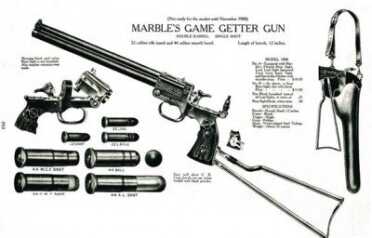
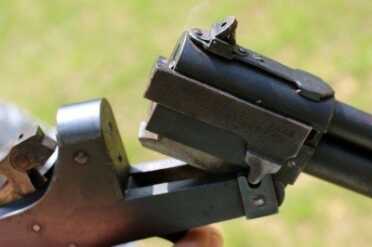
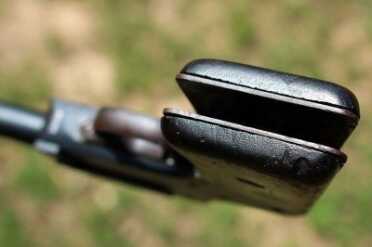
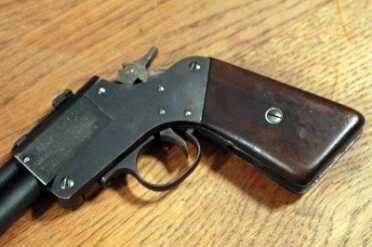
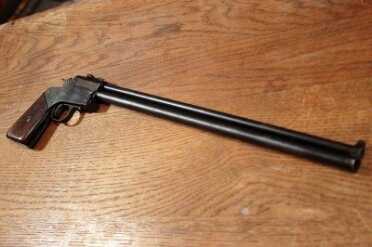
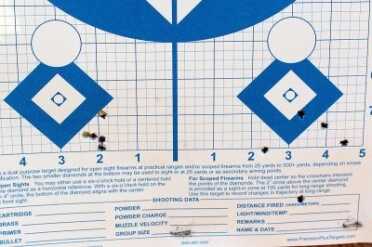
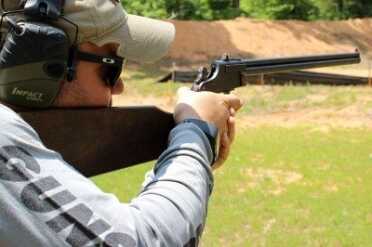
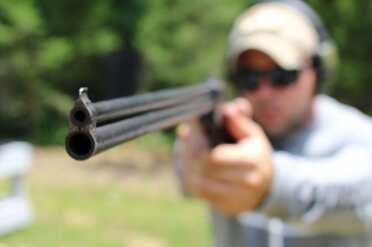
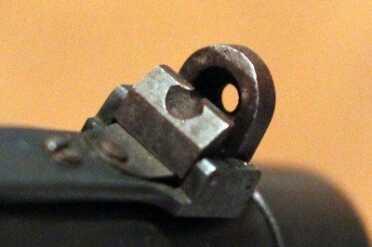
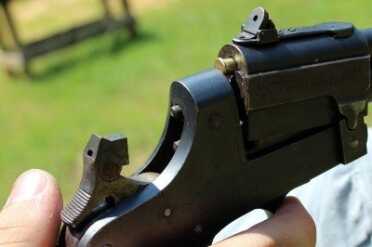
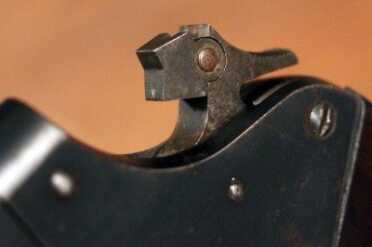
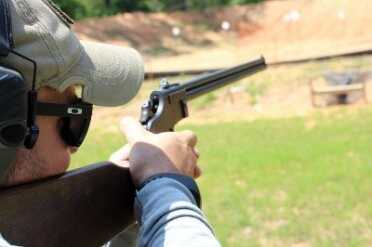
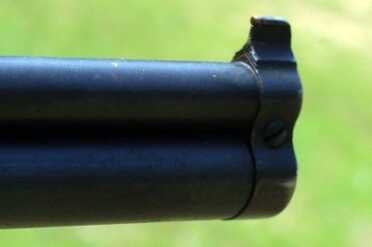
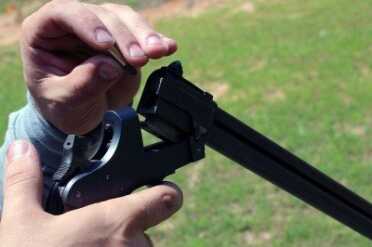
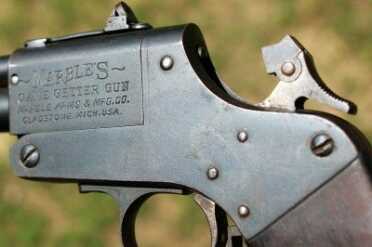
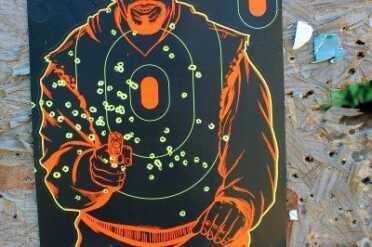
Does anyone have any 18″ Barrels for the 1908 Gamegetter?
I have a A-1908 Game Getter with no barrel if someone is interested
I have a marble 22/410 I possibly want to sell. What are they worth? It has a skeleton stock.
Thanks!
Is a receiver, worth anything? Nothing in it.no trigger nothing, Thanks Me.
Do you still have the game getter and if so does it have the extractor?
I think Eley is still making factory 2″ fourten ammo.
http://www.eleyhawkltd.com/cartridges/game/gauge/410
You can easily duplicate 2″ .410 ammo by reloading 5/16 or 3/8oz of fine shot + nitro card wad + 1/4″ felt wad + 12 grains of 2400 in a cut down 2 1/2″ case. Paper cases, roll crimps and overshot cards are more period correct.
Greener in his 1891 book Modern Shotguns gives the 2″ .410 as 3/4 dram of black powder (20.5grains) pushing 3/8oz shot. Shorty, lightweight .410’s seem to fire 3/8oz loads nicely, to a 50 foot distance. My patterns evaporate shortly after that distance.
The premier O/U firearm was the Savage 24-C in .22 LR over 20 gauge. Nothing else stacks up to this gun.
I also have a tired and worn 1st model (12″ barrel) that was my Grandfather’s, and handed down. I’m looking to get the receiver fixed, add the missing metal stock, and cleaned up to working order. I read a while back that Marble, a few years ago, allowed a reproduction company to build a batch of reproduction game getters and I imagine that is a good place to start looking for repairs and reproduction parts.
After the cal what does nra mean?
Do you know how I could acquire a metal stock for a game getter. Looking for original but at this point a repo would work for me. Thank you for your time. D
I have a pre 34 marbles with holster and stock , was a inheritance , would like to sell..
What are you asking? Send me an email if you’d like, ‘maze4 at milwpc dot com’. Thanks.
Interested in your gamegetter. Has it been sold?
I know the location of an all original Game getter In almost New Condition with the folding Metal stock original black rubber grips rear peep site Etc .I would like to sell or possibly trade
Then list it for sale on GunsAmerica.
Here’s how I arrived at a solution for 2-inch .410 shells: I had one of those SMLE No.1, MkIIIs converted to .410 as single-shot weapons for Indian troops that the Brits didn’t completely trust after the Sepoy Mutiny. I could not find any modern .410 shells to fit, nor measure the length of the chamber with any pointy, feeley tool I had. So I stuck a .303 Brit cartridge in and fired it. A dandy smooth case was formed. Make shot cups by cutting cardboard Xs (as invented by a gun magazine contributor in the late 1950s), and make any needed wads from cardboard using gasket-cutting punches bought from Harbor Freight or parts store. Seal with a little candle wax. I never shot any loaded rounds through that SMLE, but I think the visual display of the fired brass helped sell it.
Dave, come on….this was a special use for woodsmen gun who kept it in a backpack and used it to eat and defend with while cruising timber in Michigans timber heyday. NOT a sidearm but a packgun. Marbles maintains the registration records of the original sales online at their website. Still in business they also are knife makers as well up in Michigan U.P. I have only ever seen one…it came through an auction this fall locally here in Michigan and the collector who bought it came to buy it. 1400.00 or about average in good condition…more if it had included the box.
This is a very interesting bit of history and designed specifically for the times it was made. Anyone should feel proud to own one. They are not for sale very often.
My father has one that he got from my grandfather – “similar” to the one shown, except A.) the barrel selector on the hammer is different; B.) the side-piece where the extractor connects to the frame is round with concentric knurling on it; C.) the grip shape is more “gun-like” than the squarish shape of yours; D.) the side-plate says “Marble Safety Axe Co.”, and “Game Getter” is written in a type-style that looks like cow or buffalo horns [semi-circles coming together at one end, wider apart at the other and connected by a line – think “writing” something by using a bunch of powder horns]. I’m guessing it’s a First Model, since in looks more like the one in the advertisement.
Now the down-side – it has NOT been well-cared for; the stock, tang sight, and rear sight are missing, and some moron in their infinite stupidity cut the barrels down to about 5 or 6 inches. Quite honestly, it’s nothing more than a wall decoration now, or a weapon of absolute last resort.
For the record, it’s .22 on top, .44/.410 on bottom. Next time I’m back there, I’ll check the depth on the lower barrel and see which one it is. Pity about the regulations though, because a .22 top/.410 shotgun bottom would be a perfect “Kid’s First Gun”!